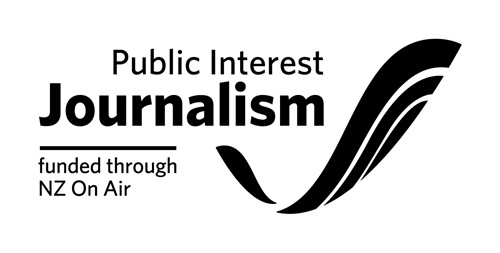As Mike Bishop steps into the Attitude offices he’s repeating the same words over and over again in his head. “Lift your heel up… touch down with your toes”. Bishop’s been involved in sport administration most of his working life. He’s facilitated All Blacks Tests, Rugby World Cup matches and Cricket Internationals. With his strong build, fitted polo shirt and George Clooney salt and pepper haircut, he’s a model of fitness. Bishop is also disabled. The phrase playing in his head is a reminder that an orthopaedic surgeon central to his early life, Geoff Taine, taught him as a child to try to correct his gait; the words have never left his head.
Bishop has CP. Cerebral Palsy. His left-sided hemiplegia is the result of the brain being deprived of oxygen during birth. As a former professional cricket player and current CEO of Harbour Sport, Bishop kept his disability private for a long time - in both business and sport. He was the first one in the boardroom at every meeting and the last to leave. No one saw his limp. Bishop passed his CP off as injury…a bad knee injury from playing senior rugby.
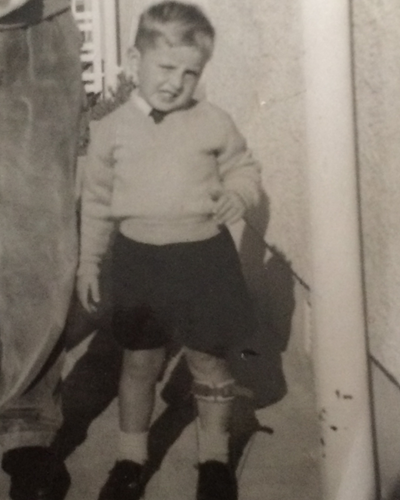
He remembers being called ‘hopalong’ and ‘cripple’ as a young man. “I was always conscious of being different from my peers”. The insults ceased as he surpassed his schoolmates in sporting ability.
By the time he was playing professional cricket, Bishop's disability was not a factor. “If you’re good enough to be there, then you’re good enough to be there. We were there to play the game we loved and get on with it.”
It was a heated moment during an NZ Rugby seminar on diversity five years ago that Bishop finally publicly identified himself as disabled to his peers. “The presenters were focusing on the number of women in the corporate sector and framing that as a lack of diversity. As a proud father of three talented daughters, Bishop strongly believes that women are essential to any conversation on diversity, but that’s not all it’s about. They were excluding people of colour and people with disabilities, It was time to stand up for others. The time was right.”
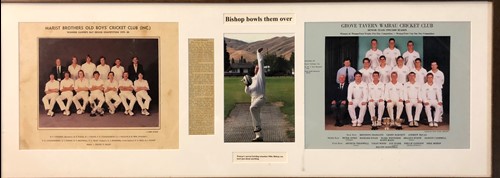
Since becoming Chair of Disability Sport Auckland (formerly Parafed), the pathways for disabled athletes are never far from Bishop’s mind. At Harbour Sport he has fostered an emphasis on prioritising programmes aimed at women/girls and people with disabilities in the region. Para sport wasn’t an option for young Mike growing up in Napier. Small town New Zealand at the time wasn’t ready to factor disabled kids into the equation.
“Young para athletes today are lucky in that the pathways and opportunities are well established. But that doesn't mean it’s easier. Finding success as a disabled athlete is never going to be easy.”
CHANGE THE GAME
If para sport had been an option in rural New Zealand in the 1960’s, would Bishop have aspired to be a Paralympian?
“I definitely would have given it some consideration. I may have chosen wheelchair rugby”
Bishop is a strong advocate for pushing adaptive sport out into the open. He’s arranged for his staff at Harbour Sport to play a game of wheelchair rugby in the upcoming months. People need to see disability sport, know the players and the complexities.
He says exposure drives a supporter base, media interest and commercial sponsors will follow.
When it comes to rugby, Bishop has a deep knowledge of the game. He has been the CEO of two different provincial rugby Unions and worked for NZ Rugby as a strategist. His disappointment that the big players in the game don’t actively connect with the adaptive version of the sport is clear. “Where’s the connection between the Wheel Blacks and the All Blacks? It’s a missed marketing opportunity for disability representation within high performance sport”
* The Wheel Blacks logo. Unknown in comparison to the silver fern of the All Blacks.

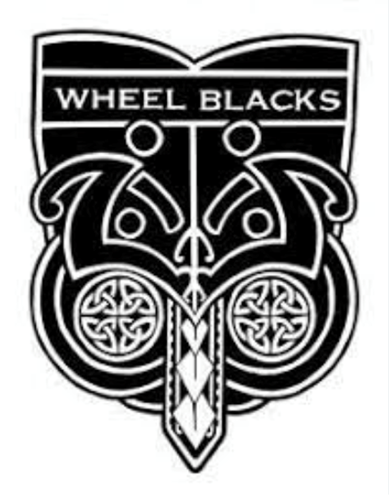
“Community awareness and Government awareness are crucial. New Zealand needs to wake up …25% of us identify as disabled”
As you would expect from a man who combines high performance sport, strategy, culture, disability and financial acumen into his average work day, Bishop has an idea to increase the public profile of para sport. The big one: “strive to blend the Olympics and the Paralympics together if it’s possible. It’s been done at the Commonwealth Games level and it could be done at the Olympic level too. It makes more sense commercially and it elevates the Paras”
Sports like yachting in New Zealand are blending events, hosting non-disabled competition alongside para sport. But progressive attitudes like this are few and far between.
There is a need to do all we can as a society to remove the lingering stigma around disability. Bishop believes sport has a lead role to play. “The general public still view the Paralympics as sub par to the Olympics. Blending the Olympics with the Paralympics is a solution that would have a wide-reaching impact.”
On Bishop's wish list is improved rehabilitation facilities for those who become disabled as a consequence of accident or injury. As someone who was born with a disability his experience has been different, but he identifies with the challenges. With his Chair's cap on he’s calling for greater investment into new facilities to be built at the new Otara Spinal Unit in Auckland. He sees an opportunity to create a world class gym that provides for rehab but also meets the training requirements of top para athletes. A standard run of the mill gym was initially proposed but Bishop is part of a committee that is challenging that. “For people who have been through an accident, finding a new lease on life is one of the biggest challenges. That’s often where para sport comes along. So why not have the spinal unit set up as a one stop shop and future proof it. Building people up and motivating them through exercise and sport. It’s physically and mentally beneficial”.
Next on his wish list is greater recognition for New Zealand’s own Para athletes, who continue to inspire Bishop. “Everyone knows Valerie Adams but for me her sister Lisa is as good, or even better. She’s a legend, Gold Medallist Paralympian shot putter who holds 4 World Records. More people need to hear her story”
Given that Bishop is a true rugby man, with a professional and personal connection to our country’s national sport, it was only right to ask him about the next All Blacks' coach.
He laughs and says he knows some of the potential candidates personally.
“Jamie Joseph and Tony Brown. Those would be my choices. Dependable, hard working, no nonsense men with proven track records”.
A description that matches Bishop himself.
